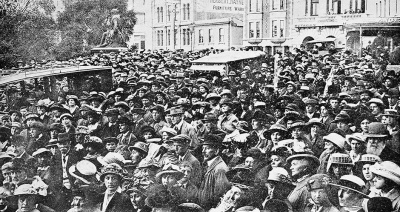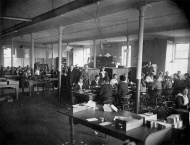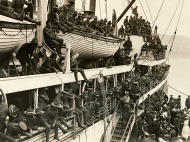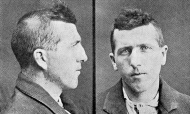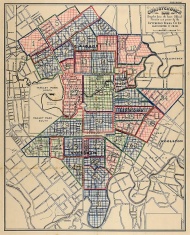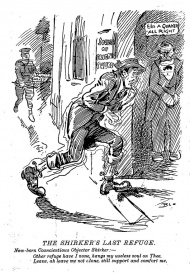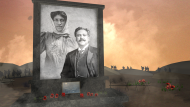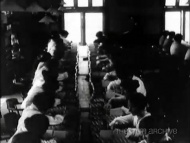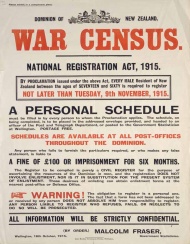Events In History
-
 22 December 1916Future prime minister charged with sedition
22 December 1916Future prime minister charged with seditionPeter Fraser’s trial in the Wellington Magistrates’ Court was the sequel to a speech in which he attacked the government’s policy of military conscription. Read more...
-
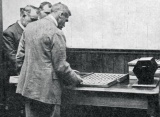 16 November 1916First conscription ballot
16 November 1916First conscription ballotThe Military Service Act passed on 1 August 1916 had made all healthy New Zealand men of military age (20 to 45) liable for active service overseas. Read more...
Articles
Māori and the First World War
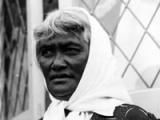
Māori reactions to serving in the First World War largely reflected iwi experiences of British actions in the 19th century.
-
Page 3 – Māori objection to conscription
Māori served in the First World War in the Maori Contingent. At home, some Māori strongly opposed conscription.
Conscientious objection and dissent

There are always supporters and opponents of a country fighting a war. Over 2500 conscientious objectors lost their civil rights in New Zealand for refusing to serve in the First World War.
- Page 1 - Conscientious objection and dissent in the First World WarThere are always supporters and opponents of a country fighting a war. Over 2500 conscientious objectors lost their civil rights in New Zealand for refusing to serve in the First
Getting the men to war
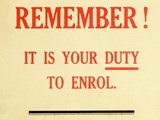
The public service was the engine of New Zealand’s military war effort between 1914 and 1918. It took charge of signing up – and later conscripting – men for service abroad, training them, clothing them, housing them and transporting them to the northern hemisphere, where they became the responsibility of the British military.
- Page 1 - Getting the men to warThe public service was the engine of New Zealand’s military war effort between 1914 and 1918. It took charge of signing up – and later conscripting – men for service abroad,
New Zealanders who resisted the First World War
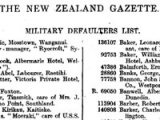
Lists of men who for a variety of reasons refused to serve in the First World War.
-
Page 2 – Imprisoned conscientious objectors, 1916-1920
A database of individuals imprisoned for rejecting military service during the First World War
-
Page 3 – Convictions for sedition 1915-18
The War Regulations Act 1914 allowed citizens to be arrested and charged with sedition for making ‘disloyal’ or ‘seditious’ statements, either verbally or in print. This page
-
Page 4 – Military defaulters list, 1919
List of 2320 men classified as defaulters during the First World War
Recruiting and conscription

Recruiting men for the New Zealand Expeditionary Force (NZEF) was among the New Zealand government’s most pressing priorities during the four difficult years of the First World War. Tens of thousands were needed every year to keep the NZEF up to strength, and finding them presented major logistical, bureaucratic and tactical challenges to those responsible.
- Page 1 - Recruiting and conscriptionRecruiting men for the New Zealand Expeditionary Force (NZEF) was among the New Zealand government’s most pressing priorities during the four difficult years of the First World
British Empire
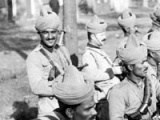
Key information and statistics about countries who fought as part of the British Empire during the First World War
- Page 2 - Dominion of New ZealandFacts and statistics about New Zealand during the First World
First World War - overview
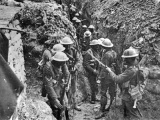
Archduke Franz Ferdinand, heir to the throne of the Austro-Hungarian Empire, and his wife Sophie were assassinated in the Bosnian city of Sarajevo. This was a key event in sparking the Great War of 1914–18.
- Page 5 - The war at homeNew Zealand played a small but useful part in the British Empire's war effort, and its essential war aim was achieved with the defeat of Germany and its allies in late 1918. New
Merchant marine
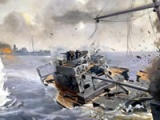
On 3 September New Zealand honours Merchant Navy Day. Here we explore the little-known but vital role played by the merchant marine during the First World War, when these civilian seafarers often found themselves in the front line of the war at sea.
- Page 8 - Politics, patriotism and protestAlthough New Zealand seafarers served in many hostile theatres, some questioned the politics of the
The Ottoman Empire
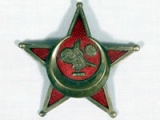
Few Kiwis today know much about one of our main First World War enemies, the Ottoman Empire - a sophisticated but often forgotten empire whose soldiers fought against New Zealand troops for four years in the Gallipoli, Sinai and Palestine campaigns.
- Page 12 - The Turkish soldier's experienceMehmetçik – ‘Little Mehmet’ – was an affectionate Turkish nickname for Ottoman (Turkish)
Biographies
-
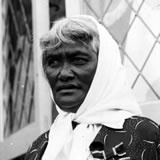 Hērangi, Te Kirihaehae Te Puea (Princess Te Puea)
Hērangi, Te Kirihaehae Te Puea (Princess Te Puea)
Te Puea Hērangi was granddaughter of the second Māori King. She was a staunch opponent of conscription for Waikato during the First World War and a prominent advocate for Tainui.
Read more... -
 Baxter, Archibald McColl Learmond
Baxter, Archibald McColl Learmond
Archibald Baxter's memoir, We will not cease, is a powerful account of dissent and its consequences, and has become a classic of New Zealand literature.
Read more... -
 Fraser, Malcolm
Fraser, Malcolm
Scotsman Malcolm Fraser was one of the most important public servants in New Zealand’s military war effort. As government statistician he was directly responsible for devising and administering the conscription system.
Read more...
Related keywords
- WW1 home front
- dunedin
- public service
- wellington city
- auckland city
- crime
- WW1 stories
- willochra
- conscientious objection
- labour party
- christchurch
- maps
- WW1
- health
- merchant marine
- 1913 strike
- trade unions
- paddy webb
- MPs
- religion
- cartoon
- te puea herangi
- maori in war
- malcolm fraser
- statistics
- genealogy
- peter fraser
- western front
- archibald baxter
- film
- british empire
- dominion of new zealand
- egypt
- gallipoli campaign
- palestine campaign
- casualties
- james k baxter
- poster
- ottoman empire
- ottoman army
- disease
- turkey
- tainui
- kingitanga
- te reo māori
- waikato
- rua kenana
- maori contingent
- newspapers
- pioneer battalion
- pacifism
-
Main image: Dunedin recruiting crowd, 1916
A crowd listening to the Mayor of Dunedin encouraging young men to enlist.

